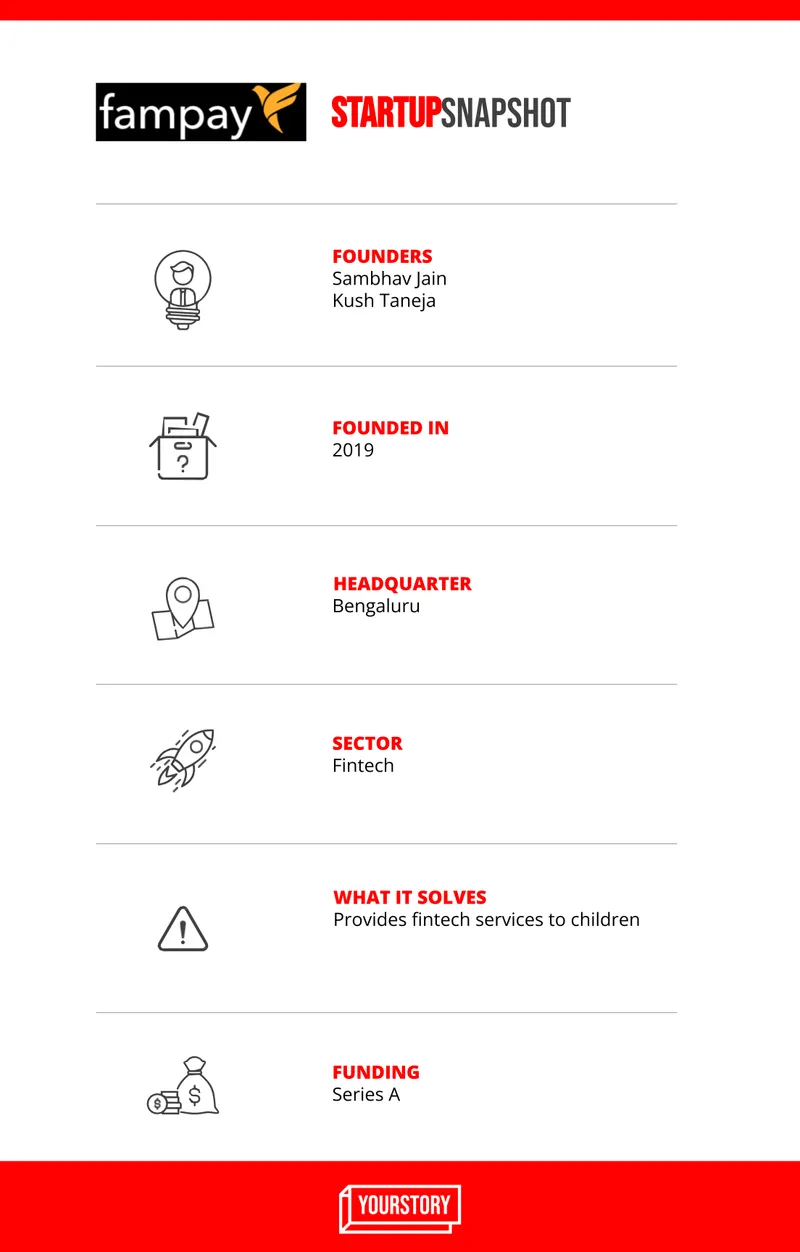[Tech50] How FamPay is helping educate children about finances
FamPay, a YourStory Tech50 2021 startup, is a finance app that aims to drive conversations around money and finances in children and teens below the age of 18. It has over two million users.
As young, fresh engineering graduates, Sambhav Jain and Kush Taneja were often tasked by family members with online bookings — either flight or movie tickets, or ordering groceries and take-out on platforms such as Swiggy and BigBasket. They recall how their parents would either sit next to them during this process, their debit or credit cards in hand, or they’d have to ring them up for OTPs (one-time passwords).
Following conversations with friends and teenagers, the duo soon realised that most parents enlisted the help of their children to help them conduct online transactions, even though they did not have their own online banking credentials. Also, at the time they were mulling this dichotomy, a lot of their friends were interviewing for jobs and when the topic of money came up, they realised young adults in India were not equipped to have money conversations.
That helped them arrive at the basic framework of — a fintech startup that gives teens below 18 the power to assert their own financial autonomy via an app and a debit card.
“Our aim was to help children understand how money works, and what financial planning means,” the founders say.
The FamPay suite of products includes an app that’s meant just for teenagers under 18, which generates a physical and a virtual card that can be used like any other card across platforms. Children don’t have to depend on their parents for OTPs, and can plan their purchases by saving up for them.
The startup, which currently has around two million users, was selected as part of YourStory’s Tech50 cohort for the large market it addresses — nearly 40 percent of India is young adults under the age of 18, and its first-mover advantage in the space.

How it works
Once the user signs up on the app, a virtual card is generated for them. This virtual card can be used as a regular debit card across all online retail platforms. For offline payments, a request can be raised for the virtual card’s physical counterpart.
The startup allows users to customise their cards to their liking — such as picking a name to display on their card, or selecting an avatar from an array of options offered, and make it more individualised and reflective of their personalities.
FamPay aims to leverage the community of children it has on the app to curate brands that specifically cater to this segment. It has been exploring deals with teen-focused brands to enable ecommerce on its app platform.
Parents can transfer fixed amounts using the FamPay app to their children, as opposed to giving them an all-access pass to their bank balance, as well as set a monthly budget and track their expenditures.
FamPay uses native Android, iOS stack for the mobile application. Its frontend stack consists of React & Next.js using Typescript. The backend uses Django, Postgres and Redis. For analytics, FamPay uses MixPanel and Metabase.
Revenue and funding
FamPay has so far raised $42.7 million in funding from investors, including Elevation Capital, Venture Highway, Sequoia, and Y Combinator. It has over two million users on the platform, currently.
The startup’s revenue ranges between Rs 5 lakh and Rs 25 lakh.
Its competitors include neobanks such as , , and , which are also focussed on teens and young adults.

Plans ahead
FamPay told YourStory it is currently working on introducing an ecommerce section on the app that can help teenagers discover brands that cater to their specific needs — whether it’s a clean-ingredient skincare company, a mental wellness platform that can help them deal with exam stress, or an edtech platform.
It added it will look at gamifying concepts such as investing, fixed deposits and other financial services on the app as well so that its users can holistically understand finance before they become financially independent.
The global neobank market is expected to grow at a compounded annual growth rate (CAGR) of around 46.5 percent between 2019 and 2026 to $394.6 billion, from $18.6 billion, according to Zion Market Research. With more and more fintech startups pivoting to a full-stack financial services model, FamPay, having the first-mover advantage, is well-positioned to capitalise on the opportunity.
Edited by Ramarko Sengupta


![[Tech50] How FamPay is helping educate children about finances](https://images.yourstory.com/cs/2/f49f80307d7911eaa66f3b309d9a28f5/Featureimages-newdeck7-1640180249519.png?mode=crop&crop=faces&ar=2%3A1&format=auto&w=1920&q=75)





